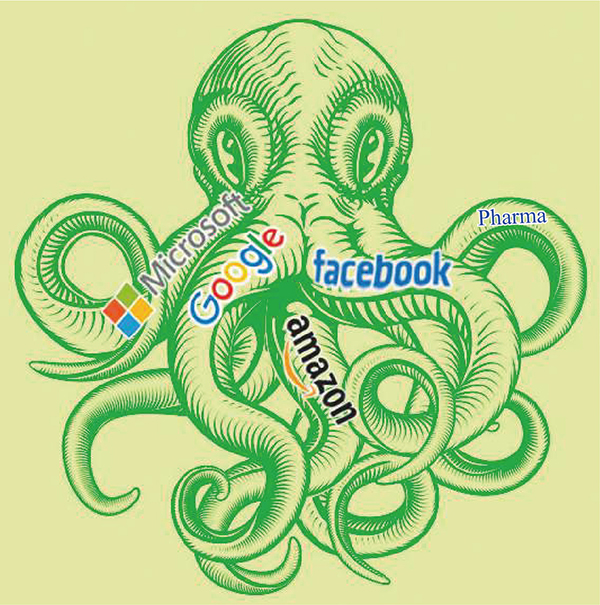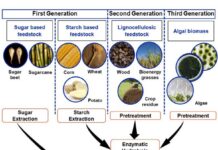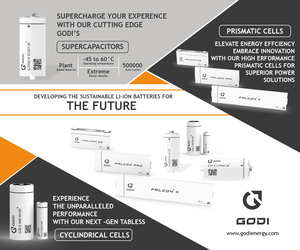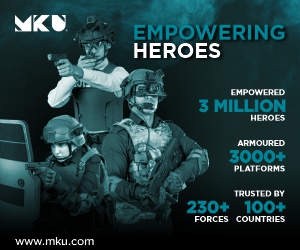Big Tech companies’ biotech invest-ments are often shown in the media in two ways, either badly cooked conspiracy theories or highly valued philanthropic moves; both are the extreme boundaries of analyzing such trends. Neither every move of an entrepreneur should be seen in the light of doubt nor is it wise to believe that business-oriented minds can pursue plain philanthropy goals. But in the long term, such normal looking activities have the potential to disturb the security environment of a country, too, and they need to be examined with a broader national security perspective.
One of the most talked-about pre-coronavirus trends was the controversial collaboration between the Big Tech, Biotech and Big Pharma players and some major sections of the Western press were involved in the discussions around these emerging trends. From an outer view, the post-coronavirus lockdown world seems like a playground of well-scripted efforts, where fear, uncertainty and doubt (FUD) strategy are nourishing the fortunes of these three booming industries. If we consider that this current trend is going to continue for a much longer period then we should prepare not just an exit strategy but a future roadmap too.
Big Tech – Biotech – Big Pharma Loop
It is interesting to see how the biotech investments of Big Tech companies, which initiated with the R&D goals, have eventually ended up in the controversial partnerships with some Big Pharmaceutical players. The pattern and ease with which these tech giants have shifted their domains to entirely different areas (in a similar timeframe) raise some serious questions.
In 2007, Google backed a biotech and personal genomics company 23andMe (founded by Anne Wojcicki, who married Google’s co-founder Sergey Brin in the same year). Since its launch, the underlying medical purpose of 23andMe’s Personal Genome Service has been highly controversial and several times this entity fell under the scrutiny of the US and UK government agencies. On 25 July 2018, to leverage the DNA test results from 5 million customers, 23andMe and drug giant Glaxo Smith Kline (GSK) entered into a partnership, too.
On 18 September 2013, Google announced its new initiative called Calico (California Life Company), and Arthur D. Levinson, Chairman and former CEO of Genentech and Chairman of Apple, took up the charge as the CEO of this healthcare venture. Calico made some interesting R&D partnerships with AbbVie (a global biopharmaceutical company), Broad Institute of MIT and Harvard, QB3 (California Institute for Quantitative Biosciences), Buck Institute, Ancestry DNA, Jackson Laboratory, and C4 Therapeutics. And, in November 2018, it entered into a collaboration with the University of Pennsylvania’s Institute for Translational Medicine and Therapeutics (ITMAT). The stated mission of Calico was to explore advanced technologies and their possible role in controlling the human lifespan and to “to devise interventions that enable people to lead longer and healthier lives” but it is surprising that even after extensive research, their expected interventions and findings are still in shadow, even for the scientist fraternity.
Another Google/Alphabet subsidiary, which often made headlines is Verily Life Sciences or Verily, an R&D organization devoted to the study of life sciences. Last year, Verily formed strategic alliances with Novartis, Otsuka, Pfizer and Sanofi kind of leading biopharma organizations, to develop digital clinical research programmes using Project Baseline’s (an initiative of Verily, started in 2017) evidence generation platform and tools. Its official objective “Making information work better so that healthcare works better” may sound philanthropic to some but the company is purely commercial. In 2016, Verily formed a joint venture called Galvani Bioelectronics with British pharmaceutical giant Glaxo Smith Kline (GSK). In 2015, Verily and Johnson & Johnson’s medical device company Ethicon, launched a startup called Verb Surgical, a robotic surgery platform. The company has delivered some health-tracking wearables including smart spoon, smart lenses and smart shoe kind of projects.
It is also interesting to note that biopharma and life sciences investments make up more than a third of Google Ventures’ portfolio. Google Ventures, the venture capital investment arm of Alphabet (an American conglomerate and restructured parent company of Google and several former Google subsidiaries) invested in some thriving biopharma/biotech companies including Editas Medicine (a leading genome editing company), Foundation Medicine (a molecular insight company), PACT Pharma, Magenta Therapeutics, Flatiron Health (a cancer research company, which was acquired by Roche, a Swiss pharma), One Medical, Arcus Biosciences, 23andMe, Grail, and Denali Therapeutics.
Microsoft
Last year, Microsoft and pharmaceutical company Novartis formed a strategic alliance “to transform medicine with Artificial Intelligence,” which is seen as one of the most expensive tie-ups between Big Pharma and Big Tech. Since 2010, tech giant Microsoft’s biological computation arm has been working on a wide range of projects including “designing molecular circuits made of DNA, and programming synthetic biological devices to perform complex functions over time and space.” The company has quietly built up a stronghold in the medical research and biological computation domains and their researchers are exploring moonshot possibilities in cell programming (to fight serious diseases) kind of emerging sectors and developing computer modeling tools to assist Big Pharma companies in drug discovery and development.
In 2000, Bill Gates, the founder of Microsoft started what he called his “second career” in philanthropy with the foundation of Bill and Melinda Gates Foundation, whose primary goal was working globally to enhancing healthcare efforts and reducing extreme poverty. In the same year, Bill and Melinda Gates Foundation invested in the GAVI (Global Alliance for Vaccines and Immunization) – a public-private global health partnership, which is also the third-largest financial contributor (8.39 per cent) to World Health Organization (WHO), next after USA (14.67 per cent) and Bill and Melinda Gates Foundation (9.76 per cent) itself.
These days GAVI is in news for COVID-19 vaccine funding and distribution to poor countries, too, but it is important here to recall that in the past (2011-12) this alliance received some serious criticism for higher pricing of vaccines and for providing Advanced Market Commitments to companies like GSK and Pfizer and was also blamed for encouraging a duopoly situation in the sector.
Amazon
Big Tech and Marketplace player Amazon and its founder Jeff Bezos have a growing inclination towards the biotech sector, too. In 2016, Jeff invested over $100 million in Unity Biotechnology, an anti-aging startup. Jeff Bezos invested in other healthcare startups, viz, ZocDoc, Mindstrong Health and cancer research startups Grail and Juno Therapeutics. These were some of Amazon’s most talked-about biotech investments but there are some lesser known initiatives too, ie, Project Gesundheit, which is a part of Amazon’s Grand Challenge R&D initiative. In 2017, CNBC channel reported that the marketplace giant Amazon has a dedicated team (led by Babak Parviz, ex-director and distinguished engineer at Google X), which quietly works on the healthcare projects. According to recent media reports, this year this group (which is sometimes called 1492) is working on a cure for the common cold and its revelation made headlines amid the coronavirus outbreak.
Facebook founder Mark Zuckerberg and his wife Priscilla Chan’s biotech initiative – Chan Zuckerberg Biohub, frequently makes headlines. One of its ambitious initiatives is the Cell Atlas project, which aims to map every type of cell in the human body. The CZ Biohub is also working on infectious diseases and rapidly developing capabilities in diagnostic tests, drug and vaccine development, using advances in biotech and machine learning technologies. Last year, Facebook acquired CTRL Labs, a startup working in non-invasive neural interface technology. After that acquisition, Facebook Reality Labs (an Augmented and Virtual Reality initiative) and CTRL labs joined forces and announced to work together on advance projects including wearable and implantable devices.
There is a lot of noise about several other moves of these Big Tech players, whether IDSeq open-source tool of Facebook or Google’s Project Nightingale (a data storage and processing project by Google Cloud and Ascension, a Catholic health care system) and its recent collaboration with Sanofi and other pharma players, which at the end signifies the growing synergies between Big Tech, Biotech, and Pharma industries. There are also lots of discussions going on whether Big Tech companies should be allowed to handle the sensitive health care domain.
India’s Concerns
Discussing only vulnerability on every global trend will not suffice. Today, India is in a position where it should make a calculation about how wise is it for a huge and diversified democracy like us to wait till the real disruption in our national security posture occurs and how much are we prepared to face the consequences of delaying the actions that we should take now to protect our national security interests?
Imagine a possible situation when the same set of players, who dominate our narrations, observe and trace every single pulse of our activity, control what we read/listen and watch, suddenly start prescribing to us X and Y medicines and tests (for diseases which may not be known to us). We will end up using the search engine algorithms that are again sorted by them. This is like an endless loop, where finding the right fact/solution or any sort of cure for a normal user will become remarkably difficult. And it is more of concern for a country like India, because none of the leading actors involved in these pursuits belongs to our land.
India certainly has tremendous capabilities in technology, biotech and pharmaceutical sectors, but we could not succeed in disrupting the existing dominance. Time for brainstorming in this direction has come and today we are already in that perfect ‘pause’ phase which is needed for such moves.



















